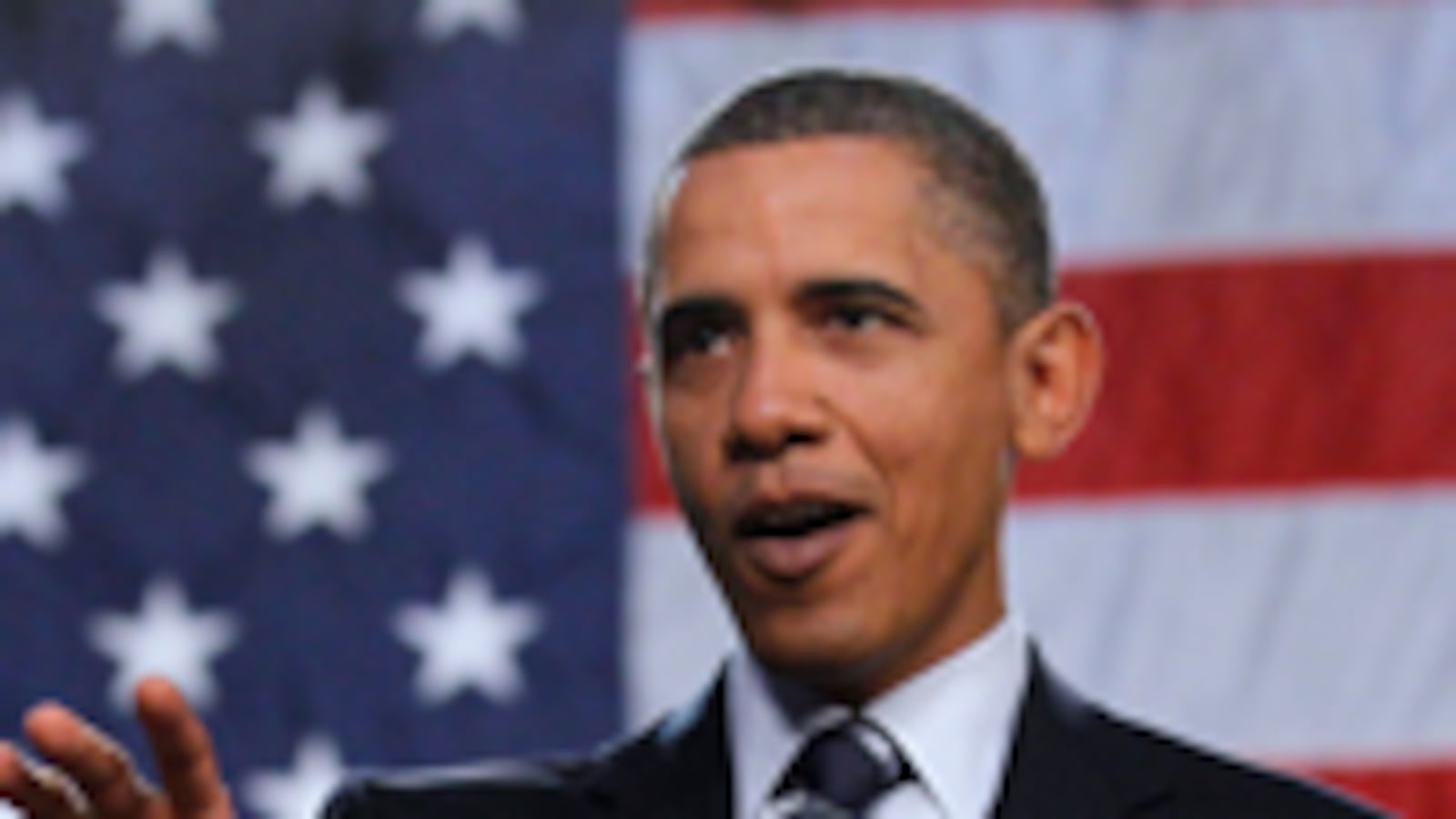
Ladies and gentleman, rev your engines! As the 2010 election heats, publishing is keeping apace. Pamela Geller, founder and editor of the popular conservative blog “Atlas Shrugs,” and Robert Spencer, a New York Times best-selling author, join the maelstrom with their treatise, The Post-American Presidency: The Obama Administration’s War on America.
Among other morsels, the book accuses Mr. Obama of “damaging the office of the presidency,” “blaming America for 9/11,” “enabling Iran’s Islamic bomb,” “destroying America’s prestige,” and—as the “most anti-Israel president” since that nation’s founding—pursuing “pro-Islamic and anti-Israel policies.” Even beyond this November, the screed might make a nice primer for the president’s competitors!
With a forward by John Bolton, The Post-American Presidency feeds the raging debate between “patriotism” and “cosmopolitanism,” between so-called “patriot-Americans” and “post-Americans.” Patriot-Americans occupy the “wonderful little pockets” of the “real America,” as Sarah Palin declared in 2008, thanking the “hard-working, very patriotic, very pro-America areas of this great nation.” Post-Americans, meanwhile, are post-national. Post-Americans have become citizens of the world—their global citizenship is deeply personal and political.
I interviewed the two authors last month. What do Geller and Spencer mean exactly when labeling this Decider-in-Chief “post-American”?
“Obama believes in a post-American world, whereas American Exceptionalism, American hegemony, and American sovereignty were once the benevolent policemen who kept the world in order,” says Geller. “He believes the world is a kind place and that we should all get along—no country is more exceptional than another.”
“Obama has followed an internationalist course,” Spencer adds. “He’s been a socialist internationalist since the beginning of his political career as indicated by his own statements as well as his associations. ‘Post-American’ is a very particular internationalism on Obama’s part that we’re referring to.”
Is the President anti-American?, I wonder, poking at the duo’s beliefs.
“He has identified himself as ‘a little Jakarta street kid,’” Geller responds. “Internationally, he is absolutely promoting anti-American interests. He is setting off a nuclear arms race in the Middle East.”
“Barack Obama is not hostile to America in the sense that he hates having anything to do with it. Barack Obama wants to transform America in his image.”
“What you essentially have [in the Obama administration] is people making policies who are not American and who don’t have American priorities or principals. They don’t share American values or the idea that they should be working for the best interest of Americans,” Spencer says.
How implausible it seems. If in fact President Obama is anti-American, why would he devote so many years, and now twelve-hour days, to serving his country?
“Why did Lenin take over Russia?,” Spenser snaps. “Barack Obama is not hostile to America in the sense that he hates having anything to do with it. Barack Obama wants to transform America in his image.”

Geller explains that she has been covering the president “daily” since he came on her radar in January 2007. That coverage inspired her to co-write The Post-American Presidency.
“I think the American people need to know who is in the White House, what shaped this man, who his friends are, who is influences are, who his mentors are. I don’t believe that this man has one normal friend.”
“Not one?” I ask.
“Not one.”
In this ongoing debate, what of the rest of us? Roughly 50 percent of the country still supports the president. Are they “anti-American”?
“No, because they don’t know the full extent of what we reveal in this book,” Spencer contends. “They don’t know what his full program is, because he didn’t reveal it during his campaign. And that is an enduring question mark over his head. Why all the secrecy? Why the concealing?”
But this handsome, media-friendly president is constantly discoursing and professing. What new information about the president does the book claim to reveal? One strains to imagine any worthwhile scoops not already known.
“There’s a lot revealed,” Geller insists. “Obama’s intention to redistribute wealth on a global scale, with the main recipients being Islamic nations and Africa. And the Copenhagen Climate Control documents weren’t really about this idea of climate control, whatever that means, but a redistribution of the wealth on a global scale. I don’t think that the American people have any clue.”
Well, speaking of those brown and Islamic countries, do these authors think the president was secretly rooting for them during the World Cup?
“I think that’s irrelevant,” Geller replies.
A reasonable observer—and even some wild-eyed conservatives—might accuse Obama of sharing too much in common with President George H.W. Bush; there’s no nickel worth of difference between the Republican and the Democrat. Father Bush was an internationalist who wanted to establish “a new world order.”
“I think that Bush was quintessentially American,” Geller disagrees. “He was a patriot. I think he loved this country. I don’t know how anyone could say that he was an internationalist. He certainly was not a fan of the international court at The Hague. I don’t know how one could possibly equate Bush and Obama in any way shape or form.”
In sync with the Tea Party rhetoric of the day, The Post-American Presidency omits the president’s middle name in some sentences, and wedge it into others – like before making an ominous accusation. Aren’t most Americans over the president’s middle name?
“I think it’s still an issue with him,” Spenser insists. “It is a point of interest that is important.”
Important? His middle name means what?
“It means primarily that he’s fundamentally sympathetic to the Islamic world,” Spencer explains.
“His abandonment of the freedom movement in Iran, where those people merely marching for freedom are being met by bullets, being imprisoned, hung, raped to death, showed his inability or deliberate inaction was tacit sanctioning of the Mullah-ocracy,” says Geller. “That will be a stain forever on American history. The reason why Barack Hussein Obama has any meaning is because of his policies. Otherwise, the name’s irrelevant in and of itself.”
Speaking of history, when Cotton Mather and the Founding Fathers imagined America as an exceptional city on the hill, globalization didn’t exercise its current might. Given the unprecedented march of global interdependence, the book’s brand of American Exceptionalism sounds dated.
“No,” counters Geller. “American Exceptionalism really means individual exceptionalism. And America was the first moral government in the history of man.”
Not really—there were such democracies before ours, even assuming you could call ours entirely “moral.”
“America was the first magnificent experiment in history where you had a government based on the individual—the heart and the soul of a country’s governing principal was life, liberty and the pursuit of happiness,” Geller declares. “So American Exceptionalism is individual exceptionalism. So I don’t think that idea is archaic. I think that idea is timeless.”
But even if the idea hasn’t changed, the world has changed. How do you make that idea relevant today?
“If the world changes and becomes evil, does that mean I too become evil?” asks Geller. I don’t care if I’m the last man standing.”
The American empire appears in rubble, so the patriot- and post-American worldviews compete ever more fiercely. Bitter anxiety ferments that America is losing both our national distinctiveness and our leadership status across the globe. What’s left of America if there is no American dream? And what’s left of America if our economic and national securities plummet in mutual self-destruction? Politicos on the left and right demand: Who wants an America where the ‘best’ working-class jobs are stacking Chinese goods at Wal-Mart?
The President lies in the crosshairs of this debate. His supporters contend that he has burnished America’s standing across the globe, and is the quintessential American. Or, as Obama explains, “In no other country on Earth is my story even possible.” American identity and progress depend on Obama’s brand of cosmopolitanism and international co-operation.
Detractors, like Pam and Robert, disagree. “I'm not convinced he's a natural born citizen,” Gen. Paul Vallely has said about the President. Growing fury over the President’s allegiance and citizenship—does his race exacerbate the debate?—brews. (Race infuses the Post-American debate, by the authors’ reckoning, too. They accuse Obama of “inciting race hatred” and of “racial grievance mongering.”)
A raft of conservative groups, like the Iowa GOP, is ramping up calls to strip Obama of his citizenship for accepting the Nobel Peace Prize. Don’t expect the post-American debates to subside anytime soon.
Geller wants The Post-American Presidency to “wake people up.”
“I hope it makes people read and inquire and think and question who’s running in their districts and what their positions are on healthcare and energy and property rights and eminent domain and the basic fundamental principals of America,” she explains.
“Let’s vote some Americans into office,” Spencer chimes.
“People have to get involved,” Geller says. “People must get involved at a local level, in their precincts, at their school boards. They have to know what they stand for. Americans must take back America.”
From whom? I ask.
Spencer: “From the internationalists.”
Geller: “From the elite.”
Plus: Check out Book Beast, for more news on hot titles and authors and excerpts from the latest books.
Rich Benjamin is author of Searching for Whitopia: An Improbable Journey to the Heart of White America, winner of a 2009 Editor's Choice Award (Booklist, the American Library Association). His work appears regularly in the media, including on MSNBC, CSPAN, NPR, Fox Radio, USA Today, The New Yorker, and Salon. He is Senior Fellow at Demos, a non-partisan national think tank.






